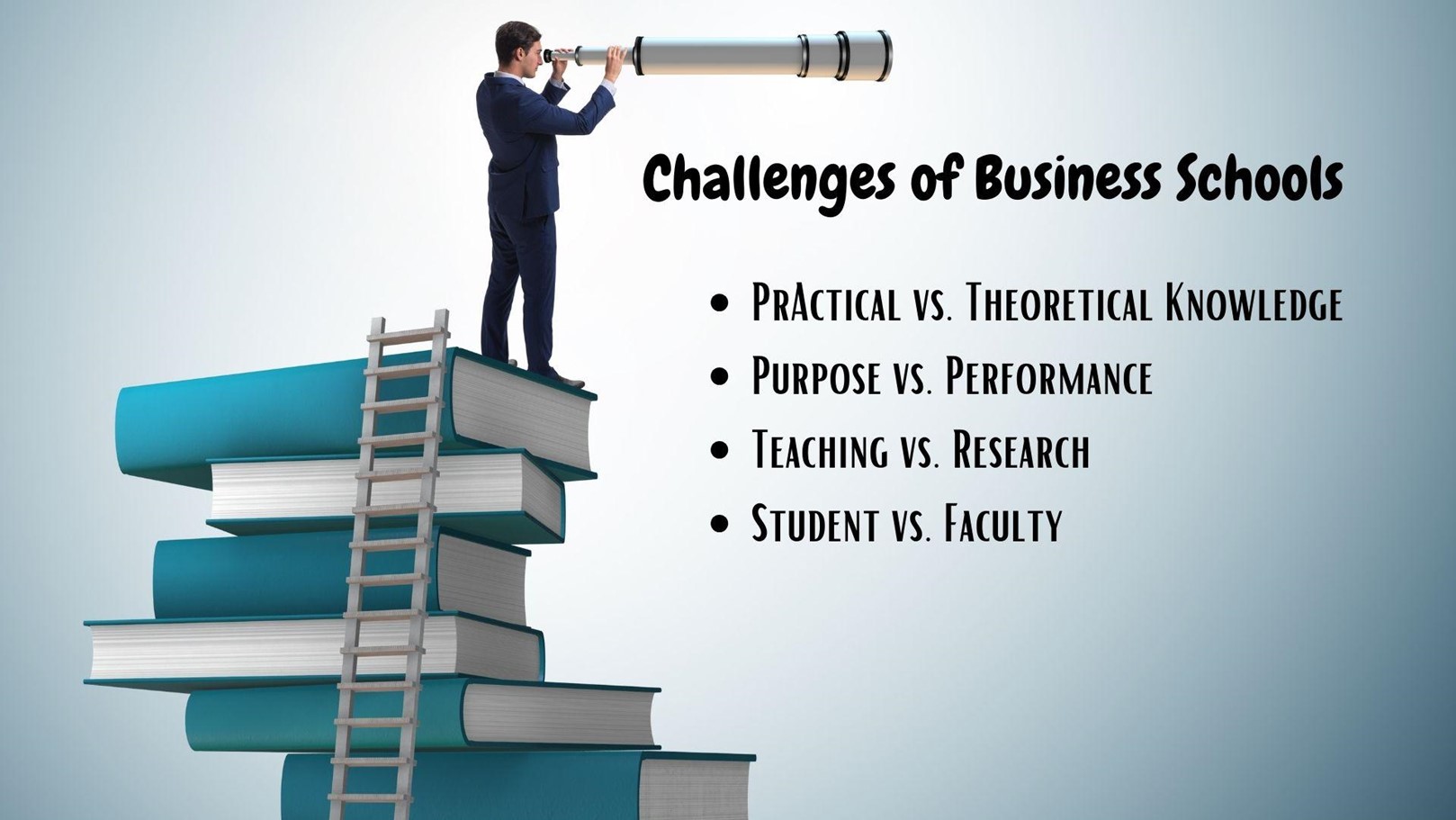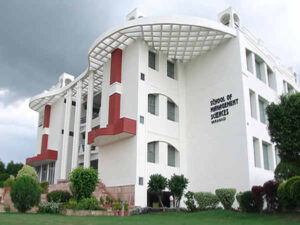Business schools worldwide are at a crossroads, grappling with challenges intrinsic to the sector, from balancing theoretical knowledge with practical skills to maintaining legitimacy amidst scrutiny. The quest is real – to create professionals enriched with real-world skills, critical thinking, and a global perspective, capable of navigating the ethical and societal dimensions of business.
Amidst these challenges, SMS Varanasi stands as a beacon of innovative management education, moulding future leaders with an enriched, value-driven curriculum.
Challenge 1: Balancing Practical and Theoretical Knowledge

As a business school, we struggle to achieve a balance between practical and theoretical knowledge in research. We are always trying to find ways to align the management education we offer with real-world applications.
At the School of Management Sciences (SMS), Varanasi, we have designed our BBA and MBA curriculums to intertwine theoretical frameworks with practical insights. Also, we offer a lot of opportunities allowing students to apply classroom knowledge to real-world business scenarios, such as:
- case studies,
- internships, and
- industry interactions.
We strive to offer business education that empowers our students with a robust understanding of business dynamics, preparing them for diverse roles in the industry.
We have:
- Centre For International Relations to promote international partnerships and collaboration with educational institutions and universities abroad.
- Centre for Consultancy Services to provide consultancy services to businesses and organizations on a range of management and technical issues.
- Advanced Centre for Corporate Training to offer training programs to executives and organizations on the latest management practices and trends.
Challenge 2: Purpose versus Performance

One of the biggest challenges of business schools today is whether they should focus on instilling a sense of purpose in future managers or business leaders or on ensuring their optimal performance.
‘Should the focus be on creating value-driven leaders or on enhancing the school’s academic reputation?’
At SMS Varanasi, we have a Centre for Spiritualism and Human Enrichment (CSHE) that focuses on the holistic development of students pursuing our BBA or MBA programmes. We have embraced the ethos of creating value-driven professionals without compromising academic excellence.
The advantage of being an autonomous B-school is that we have the liberty to cultivate a learning environment where students are encouraged to:
- explore their purpose,
- understand ethical dimensions, and
- enhance their performance simultaneously.
We aspire to mould individuals who can contribute to society while achieving professional success, rendering SMS Varanasi a revered institution in management education.
We also have a Language Lab to help students polish their foreign language skills and a Behaviour Dynamics Lab that offers psychometric tests to students as well as offer them mental health support as required.
Challenge 3: Teaching versus Research Focus

The challenges of business schools, especially ones with fewer resources, include whether they should focus on teaching or research work. School of Management Sciences refuses to compromise with any of them.
We publish two peer-reviewed international journals:
- SMS Journal of Entrepreneurship & Innovation (SMS JEI): This journal focuses on entrepreneurship, innovation, skill development, and general management.
- Management Insight: This journal focuses on research works on a wide range of management topics, including leadership, HR, marketing, finance, and operations.
The research of SMS Varanasi faculty and students also gets published in various renowned national and international journals and conferences. Some recent examples of research work done by our students are:
- The impact of artificial intelligence on the future of work
- The role of social media in marketing and advertising
- The challenges and opportunities of sustainable business practices
- The impact of the COVID-19 pandemic on the Indian economy
- The role of women in entrepreneurship
And our faculty harmonizes their research strength with teaching prowess. While they engage in innovative and relevant research work, they also offer holistic, enriched, and dynamic learning experiences to our students.
Challenge 4: Student-Centric versus Faculty-Centric Approach

For a long time, business schools have been struggling with the dilemma of what they should prioritize:
- Placements of Students
Or
- Faculty Development Processes.
On one hand, there is the cost of running a business school (and hence, its sustainability) depends on its students who pay for their education and expect to receive excellent value in return. Their success greatly enhances the reputation of the school.
Also, students are the best ambassadors for their school. So, great placements and career success of its students need to be the top priority for a B-school.
On the other hand, it is the faculty that teaches and mentors students. The quality of faculty determines the quality of education and research support students get. Knowledgeable faculty members help in keeping the curriculums of business education programmes up-to-date and make sure that the college runs smoothly and efficiently.
At SMS Varanasi, we adopt a synergistic approach, emphasizing both student development and faculty enrichment. We have:
- SMS Knowledge Management Centre: Where we create and disseminate knowledge in management, communication, commerce, and computer applications.
- Centre for Research & Development: This works to promote innovative research and development in management and related fields.
- Centre for Management Development Programs: This provides management development programs to executives and organizations.
- Centre for Data Analysis and Management: Where students and professionals pursue data analysis and management education programs.
- Centre For Entrepreneurship, Innovation & Skill Development: This promotes entrepreneurship, innovation, and skill development through programs and initiatives.
- Centre of Online Learning and E-Resources: That provides online learning programs and electronic resources to students and professionals.
Besides these, we constantly strive to provide all the support and facilities our faculty and students need to achieve their true potential.
Conclusion
At SMS Varanasi, we adeptly navigate through the prevailing challenges of business education by harmoniously blending practical insights with theoretical frameworks, fostering value-driven leadership, and maintaining a balanced focus on teaching and research. By adopting a synergistic approach towards student and faculty development, we have established ourselves as an emblem of innovative and globally attuned management education, striving to mould professionals who are equipped to contribute both to the industry and society.





